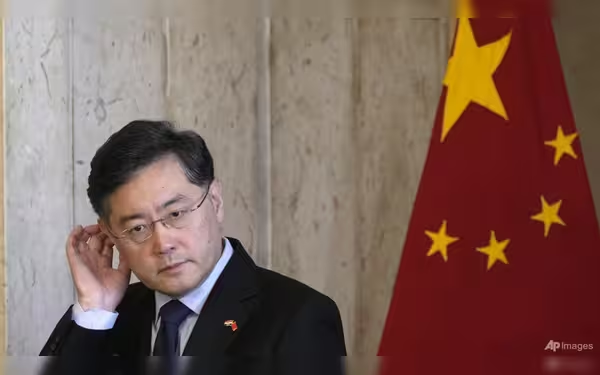Saturday, November 16, 2024 09:40 PM
Qin Gang's Disgrace: Speculations Surrounding China's Former Foreign Minister
- Qin Gang's removal sparks allegations of torture and suicide.
- Reports suggest he is now in a low-level publishing role.
- Focus on Qin Gang reflects broader geopolitical tensions.
 Image Credits: channelnewsasia
Image Credits: channelnewsasiaSpeculation surrounds Qin Gang's fate after his removal as China's foreign minister, highlighting geopolitical tensions and media narratives.
In recent months, the fate of China’s former foreign minister, Qin Gang, has become a topic of intense speculation and intrigue. Since his sudden removal from office in July, various reports have emerged, painting a grim picture of his circumstances. Allegations of torture and even suicide have circulated in Western media, creating a cloud of mystery around his current status. However, the latest reports suggest a less dramatic outcome: that Mr. Qin is alive but has been relegated to a low-level publishing position. This claim, while seemingly straightforward, has been met with skepticism, particularly from a Hong Kong media outlet that has disputed the information.
The backdrop to this situation is the increasingly strained relationship between the United States and China. As tensions rise over critical issues such as trade, Taiwan, and ongoing conflicts in regions like Ukraine and Gaza, the spotlight on Qin Gang’s fate appears to serve a dual purpose. Analysts suggest that the focus on his situation may be a strategic move by Western media to divert attention from pressing global issues that could reflect poorly on the U.S. itself.
Mr. Einar Tangen, a senior fellow at the Taihe Institute in Beijing, has pointed out that by concentrating on China, Western platforms may be attempting to shift scrutiny away from their own challenges. This tactic not only highlights the complexities of international relations but also underscores the role of media in shaping public perception. The narrative surrounding Qin Gang is not just about one individual; it reflects broader geopolitical dynamics that are at play.
As the world watches these developments unfold, it is essential to consider the implications of such speculation. The fate of political figures can often serve as a barometer for the health of a nation’s political landscape. In this case, the uncertainty surrounding Qin Gang may indicate deeper issues within the Chinese government, particularly in how it handles dissent and internal challenges.
While the fate of Qin Gang remains uncertain, the discussions surrounding it reveal much about the current state of global politics. As tensions between major powers continue to escalate, the narratives we consume can significantly influence our understanding of these complex relationships. It is crucial for readers to approach such stories with a critical mind, recognizing the interplay between media narratives and geopolitical realities.













